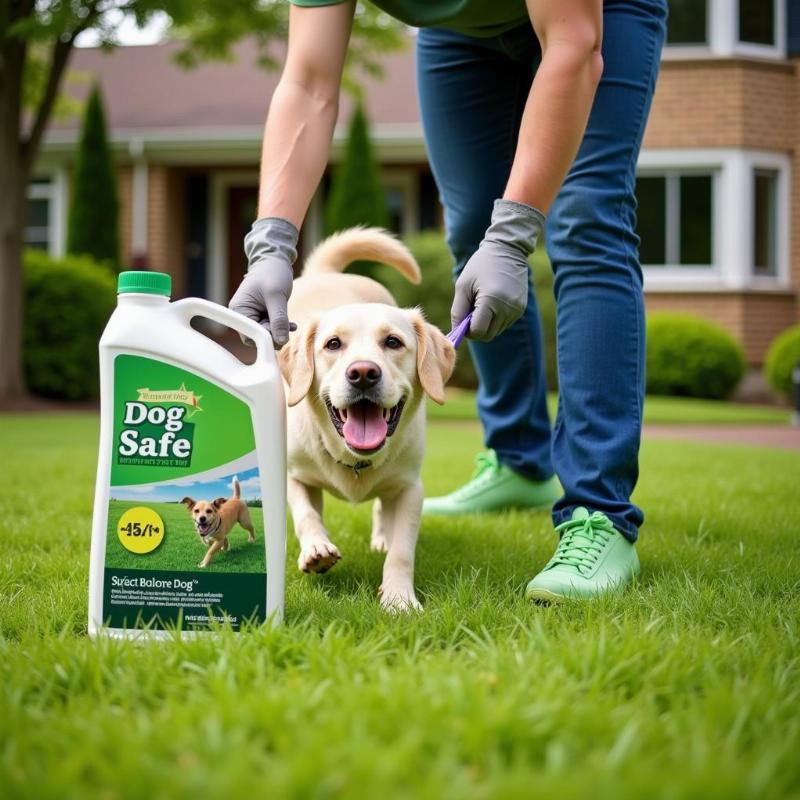Roundup, a widely used herbicide, is a common sight in American gardens and lawns. But for dog owners, a crucial question arises: is Roundup safe around dogs? This article will delve into the potential risks associated with Roundup exposure in dogs, offering practical guidance on how to protect your furry friends.
Understanding Roundup and its Potential Risks
Roundup’s active ingredient is glyphosate, a chemical that targets an enzyme essential for plant growth. While glyphosate isn’t directly targeted at animals, studies suggest potential adverse effects on dogs with direct or indirect exposure. These can range from mild skin irritation to more serious gastrointestinal issues if ingested. The level of risk correlates with the concentration of glyphosate, the duration of exposure, and the individual dog’s health and size.
Symptoms of Roundup Exposure in Dogs
If your dog has been exposed to Roundup, they might exhibit various symptoms. These can include:
- Vomiting and diarrhea
- Loss of appetite
- Lethargy
- Drooling
- Skin irritation, redness, or swelling
- Difficulty breathing (in severe cases)
If you observe any of these symptoms following potential Roundup exposure, contact your veterinarian immediately. Prompt veterinary attention is crucial for effective treatment and management of potential complications.
Protecting Your Dog from Roundup
Protecting your dog from Roundup exposure involves proactive measures and mindful practices. Follow these essential tips to minimize risks:
-
Keep your dog away from treated areas: After applying Roundup, restrict your dog’s access to the treated area for the duration recommended on the product label. This is typically between a few hours to a couple of days.
-
Choose pet-friendly alternatives: Explore pet-safe herbicide options available in the market. Numerous products effectively control weeds without posing a threat to your canine companion. Consult with your local garden center for suitable alternatives.
-
Properly store Roundup: Store Roundup and other herbicides out of your dog’s reach, preferably in a locked cabinet or shed. Ensure that containers are tightly sealed to prevent accidental spills or leaks.
 Applying dog-safe herbicide
Applying dog-safe herbicide
What to Do if Your Dog is Exposed to Roundup
Despite precautions, accidental exposure can occur. If your dog comes into contact with Roundup:
- Rinse the affected area: If Roundup comes into contact with your dog’s skin or fur, rinse the area thoroughly with clean water.
- Contact your veterinarian: Even if your dog doesn’t exhibit immediate symptoms, consult your veterinarian. They can provide tailored advice and determine if further examination or treatment is necessary.
Roundup and Long-Term Health Concerns
While the immediate effects of Roundup exposure are relatively well-documented, the long-term health implications are still under investigation. Some studies suggest a potential link between chronic glyphosate exposure and certain health issues in animals, but further research is needed to establish conclusive evidence. Adopting preventive measures is the best approach to safeguarding your dog’s health.
Conclusion
While Roundup can be a useful tool for maintaining your lawn and garden, it’s essential to be mindful of its potential risks to your dog. By taking appropriate precautions and following safety guidelines, you can create a safe and healthy environment for your furry friend while keeping your outdoor spaces looking their best. Remember, prioritizing your dog’s safety is key to responsible pet ownership.
FAQ
- How long after applying Roundup is it safe for dogs? Refer to the product label for specific instructions. Generally, it’s recommended to keep dogs away from treated areas for at least 24-72 hours.
- Are there any natural weed killers safe for dogs? Yes, options like vinegar solutions and certain essential oils can be used as pet-safe weed control methods.
- What are the signs of glyphosate poisoning in dogs? Symptoms can range from vomiting, diarrhea, and lethargy to skin irritation and difficulty breathing.
- Should I induce vomiting if my dog ingests Roundup? No, do not induce vomiting unless instructed by your veterinarian.
- Can Roundup cause cancer in dogs? While some studies suggest a potential link, more research is needed. Minimizing exposure is the best preventative measure.
Beautdogs.us is your trusted source for comprehensive and engaging information on dog care and companionship in the USA. We offer expert advice on dog breeds, health, nutrition, and training, equipping you with the knowledge and resources to provide the best care for your canine friend. Whether you’re a new dog owner or a seasoned enthusiast, Beautdogs.us provides authoritative information on all aspects of dog ownership. Contact us for personalized support at [email protected] or call us at +1 501-555-7529.